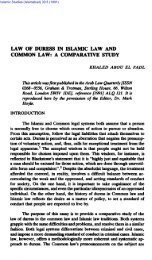doc.pdf
doc.pdf
doc.pdf
Create successful ePaper yourself
Turn your PDF publications into a flip-book with our unique Google optimized e-Paper software.
THE GRECO-SYRIAC AND ARABIC SOURCES OF BARHEBRAEUS' MINERALOGY 26 1<br />
science passed from the Greeks to the Arabs. Due to the progress of the sciences<br />
under Islam, however, the rdes had been reversed by the time we reach the 13th<br />
century.% Credit is due to Barhebraeus for having had the courage to acknowledge<br />
this fact and having devoted his energy to transferring the knowledge now available<br />
in Arabic and Persian into the language of his people. Barhebraeus was not, of<br />
course, the first sy&c author to use Arabic sources - Bar Shako, whose name<br />
has been mentioned above, is particularly important as a precursor of Barhebraeus<br />
in this respect - but Barhebraeus stands quite alone in the scale on which he<br />
ransacked Arabo-Persian sources .and is unique also in the way he then attempts<br />
to create a new synthesis out of the materials taken from these sources and the<br />
, materials found in older Syriac literature. Barhebraeus was undoubtedly conscious<br />
of the fact that what he was attempting was something new and innovative and<br />
this, no doubt, is what is on his mind when he mentions in his proem to Cand. his<br />
fear that "someone coming across this work for the first time might judge it to be<br />
something foreign to the priestly enclos~res".~~<br />
Western scholars have been fond of comparing Barhebraeus to great names<br />
in European literature, such as Thomas ~~uinas,~' Albertus ~ a ~ n uPico s , della ~ ~<br />
Mirandola and Isidore of ~eville.'~ In the light of what we now know of his<br />
endeavours to render into the language of his people the knowledge which was<br />
available in his time in Arabic, along with what we have always known about his<br />
mastery of Syriac prose, it is perhaps not so wide of the mark to compare him<br />
also to the one who once laid the foundations of Latin as a vehicle of scientific<br />
discourse by rendering into his lucid and fluent prose the knowledge which was<br />
available to him in Greek. If Barhebraeus, a religious and political leader of his<br />
people, had been asked how he could compose his works with such speed, he<br />
might have answered as the augur and former consul had done to his friend:<br />
"drmiypa$a sunt, minore labore fiunt; verba tantum adfero, quibus abundo (They<br />
are mere transcripts, requiring less work. I just contribute the words, which I<br />
% For Barhebraeus' own comment on the situation, see BH Chron. [Bedjan] 98.13- 18: 'There<br />
arose among them [sc. the Arabs] philosophers, mathematicians and physicians who surpassed<br />
the ancients in the subtlety of their intellect. Placing them not on another foundation but on<br />
Greek basements, they perfected the buildings of the sciences, which were great on account of<br />
their clear diction and their most studious investigations, so that we, from whom they received<br />
knowledge through the translators - all of whom were Syrians - are now forced to ask them for<br />
it"<br />
97 Cand. pmem [BakoS] 25.1: hcotr u p a w dm<br />
6bmsi A Ad rdv-<br />
98 B d (1834) 486; cf. Koffler (1932) 26 n. 5; Khoury (1950) L2, 122; id. (1%5) 12; Kawerau<br />
(1972) 63.<br />
99 Renan (1852) 67; Baumstarlr, GSL 312.<br />
100 Respectively. Leroy (1 957) 230. and id. (1 971) 250.
















